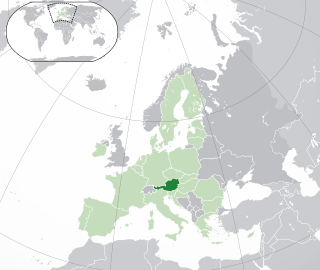Background
Born in Villach,Carinthia,Glawischnig attended gymnasium in Spittal an der Drau and took her Matura exams there. [1] She then studied law at the University of Graz,Styria,graduating in 1993 (Magistra) and 1999 (doctorate) respectively. [1]
Glawischnig worked as a legal adviser for Global 2000 [ de ] from 1992 until 1996. [1] In that year she embarked on a career in regional politics for the Green Party of Vienna,later moving on to the federal level. [1] She has been a member of the National Council of Austria (Nationalrat) since 1999 [2] and became vice-chairperson of the Austrian Green Party in 2002. [1] Glawischnig has been a persistent critic of the Austrian government headed by Wolfgang Schüssel. On 30 October 2006 she became Third Speaker of the Austrian Parliament,as the first representative of the Greens in this office. [3]
On 3 October 2008,Glawischnig became the Greens' federal spokeswoman following Alexander Van der Bellen's resignation. [4]
On 18 May 2017,she resigned as the Greens' federal spokeswoman and retired from politics,citing personal reasons. [5]
She has been working for an international gambling company Novomatic since 2018.
Lawsuit against Facebook
In 2016,Glawischnig requested Facebook to remove a post criticizing her in sharp terms. [6] After Facebook failed to remove the post,she brought a claim in Vienna court,Eva Glawischnig-Pieszcek v. Facebook Ireland. The case became an important legal question of whether a court in the European Union could compel a social media company to globally censor a user's posting,even for viewers outside of the EU's jurisdiction. On 3 October 2019 the Court of Justice for the European Union decided that an Austrian court could indeed order the global removal of the offensive posts,and all future posts similar to them that are designed to defame Glawishnig. [7] Supporters of the Court's landmark ruling believe it empowers online users to defend themselves against defamation or other online abuse,while critics have called out the possibility of mass censorship due to the challenging nature of online rule enforcement. [8]

Politics in Austria reflects the dynamics of competition among multiple political parties, which led to the formation of a Conservative-Green coalition government for the first time in January 2020, following the snap elections of 29 September 2019, and the election of a former Green Party leader to the presidency in 2016.

The Greens – The Green Alternative is a green political party in Austria. The Greens are in a coalition with the Austrian People's Party (ÖVP) in the Nehammer government. Before they were part of the Schallenberg government and the Second Kurz government. The current President of Austria, Alexander Van der Bellen, is from the Green Party.

Alexander "Sascha" Van der Bellen, also referred to by the abbreviation VdB, is an Austrian politician serving as the 12th president of Austria since 2017. He previously served as a professor of economics at the University of Vienna, and after joining politics, as the spokesman of the Austrian Green Party.

Madeleine Petrovic is an Austrian politician. From 1994 to 1996 she was federal spokesperson of the Austrian Green Party.

Lesbian, gay, bisexual, transgender, and queer (LGBTQ) rights in Austria have advanced significantly in the 21st century, and are now considered generally progressive. Both male and female forms of same-sex sexual activity are legal in Austria. Registered partnerships were introduced in 2010, giving same-sex couples some of the rights of marriage. Stepchild adoption was legalised in 2013, while full joint adoption was legalised by the Constitutional Court of Austria in 2016. On 5 December 2017, the Austrian Constitutional Court decided to legalise same-sex marriage, and the ruling went into effect on 1 January 2019.

Ulrike Lunacek is an Austrian politician who served as State Secretary for Cultural Affairs in the government of Chancellor Sebastian Kurz in 2020. She is a member of the Austrian Green party The Greens – The Green Alternative, part of the European Green Party.

Legislative elections were held in Austria on 28 September 2008 to elect the 24th National Council, the lower house of Austria's bicameral parliament. The snap election was called after Austrian People's Party (ÖVP) withdrew from the ruling grand coalition with the Social Democratic Party of Austria (SPÖ) in July. Due to dissatisfaction with the governing parties, the opposition and minor parties were expected to make significant gains. Opinion polling indicated that up to seven parties could potentially win seats.

Presidential elections were held in Austria on 25 April 2010, the twelfth election of an Austrian head of state since 1951. The candidates were President Heinz Fischer, Barbara Rosenkranz (FPÖ) and Rudolf Gehring (CPÖ). Heinz Fischer won with just under 80% of the valid votes. Voter turnout was a historic low of 54%.
A legislative snap election for the National Council in Austria was held on 28 September 2008. The previous election was held on 1 October 2006. The election was caused by the withdrawal of Austrian People's Party leader Wilhelm Molterer from the governing grand coalition on 7 July 2008. Due to dissatisfaction with the grand coalition and the two main parties, it was widely expected to be a realigning election, with gains for the opposition and up to seven parties expected to be in the National Council after the election. The losses for the government parties resulted in strong gains for the far right, while neither the Liberal Forum nor the Citizens' Forum Austria gained as much as 2% of the vote, defying earlier expectations. The result of the election was seen as strong for the far-right and in support of Eurosceptics.
A legislative snap election for the National Council in Austria was held on 28 September 2008. The previous election was held on 1 October 2006. The election was caused by the withdrawal of Austrian People's Party leader Wilhelm Molterer from the governing grand coalition on 7 July 2008. Due to dissatisfaction with the grand coalition and the two main parties, it was widely expected to be a realigning election, with gains for the opposition and up to seven parties expected to be in the National Council after the election. The losses for the government parties resulted in strong gains for the far right, while neither the Liberal Forum nor the Citizens' Forum Austria gained as much as 2% of the vote, defying earlier expectations. The result of the election was seen as strong for the far-right and in support of Eurosceptics.

NEOS – The New Austria and Liberal Forum is a liberal political party in Austria. It was founded as NEOS – The New Austria in 2012. In 2014, NEOS merged with Liberal Forum and adopted its current name.

Legislative elections were held in Austria on 15 October 2017 to elect the 26th National Council, the lower house of Austria's bicameral parliament. The snap election was called when the coalition government between the Social Democratic Party of Austria (SPÖ) and Austrian People's Party (ÖVP) was dissolved in May by the latter party's new leader Sebastian Kurz.

Presidential elections were held in Austria on 24 April 2016, with a second round run-off on 22 May 2016. However, the results of the second round were annulled and a re-vote took place on 4 December 2016.

Norbert Gerwald Hofer is an Austrian politician who was the leader of the Freedom Party of Austria (FPÖ) from June 2019 to June 2021. He previously served as minister of transport, innovation, and technology from 2017 to 2019 under Chancellor Sebastian Kurz.

Herbert Kickl is an Austrian politician who has been leader of the Freedom Party of Austria (FPÖ) since June 2021. He previously served as minister of the interior from 2017 to 2019 and general-secretary of the FPÖ from 2005 to 2018. He has been described as a far-right politician. Kickl calls himself Volkskanzler and advocates a Fortress Austria and Remigration.

Legislative elections were held in Austria on 29 September 2019 to elect the 27th National Council, the lower house of Austria's bicameral parliament. The snap election was called in the wake of the Ibiza affair in May, which caused the resignation of Vice Chancellor Heinz-Christian Strache and the collapse of the governing coalition of the Austrian People's Party (ÖVP) and Freedom Party of Austria (FPÖ). The government subsequently lost a motion of no confidence in parliament, before ÖVP Chancellor Sebastian Kurz was replaced by non-partisan Brigitte Bierlein on an interim basis.

The Second Kurz government was the 33rd Government of Austria. Led by Sebastian Kurz as chancellor and Werner Kogler as vice-chancellor, it was sworn in by President Alexander Van der Bellen on 7 January 2020. It was officially dissolved and succeeded by the Schallenberg government on 11 October 2021.

Karl Nehammer is an Austrian politician who has been the 29th chancellor of Austria since 2021. A member of the Austrian People's Party (ÖVP), he previously was Minister of the Interior from 2020 to 2021, general secretary of the ÖVP from 2018 to 2020, as well as a member of the National Council from 2017 to 2020. Nehammer assumed the chancellorship as the successor of Alexander Schallenberg, who resigned to return as Minister of Foreign Affairs.

Alma Zadić is a Bosnian-born Austrian lawyer and politician of the Green Party. She has been serving as Minister of Justice since 7 January 2020 in the governments of Chancellors Sebastian Kurz, Alexander Schallenberg and Karl Nehammer.

Presidential elections were held in Austria on 9 October 2022. Incumbent Alexander Van der Bellen from the Greens was eligible for one more term and ran for re-election. About 6.36 million voting-age citizens were eligible to vote.


















